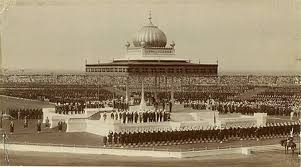Eighty years ago: the Sun Drops Below the Hills of the Raj and Rises over the Alps of the Third Reich
Unconsciously King George VI
sounded the death-knell of the British Empire in India with the announcement that
he would not be travelling there for a Coronation Durbar the following
winter. The formal proclamation of the British monarch as Emperor or Empress of India
had been the cornerstone of Britain’s constitutional position in the
sub-continent. It was a prime example of a great tradition that only happened
once. There had been Durbars for Victoria and Edward VII but they had not been present in person. The only King/Emperor to attend his own Durbar was George V in 1911 at apogee of the Empire's might. The
ceremony was a byword for magnificent lavishness and was held in a huge,
specially built amphitheatre. Edward VIII had dragged his heals over any
thought of participating in a similar ceremony, as he did in all things
concerned with India. As Prince of Wales he had resisted his father’s wish for
him to visit India. His brother naturally took a more dutiful approach, but the
huge cost of such an event and – not that London admitted it was was consideration – Indian nationalism combined to
force postponement, for ever as it turned out. The political establishment had pulled out all the stops to ensure that his coronation as King of Britain succeeded so as to give a stamp of full legitimacy to his uncomfortable and unexpected succession but the tank had run dry. George was the last sovereign to
bear the proud Ind. Imp handle but
the global cataclysm that lay ahead meant that he would also lose it.
The London government’s scheme
for very limited political autonomy for India had never managed to get up and
running; it had not managed to fit enough wheels to ensure stability and
traction. Even those that had been fitted were now in process of coming off. Two
of the state government’s established under the new legislation in Bihar and
the United Provinces resigned because they could not over-ride the “reserved”
powers of the London-appointed (white) governors and order the release of
political prisoners.
Meanwhile in Central Europe Adolf
Hitler was operating an informal empire with a good deal more ruthlessness and
success. Kurt Schuschnigg, the Austrian Chancellor, had visited him at his
mountain retreat, the Berghof, to try to stabilize relations with Germany. He found
himself peremptorily instructed to reconstruct his cabinet to enhance Nazi
representation. In particular Arthur Seyß-Inquart, not yet a party member but
deeply sympathetic, was to be appointed as security minister with full control
of all police. Schuschnigg and Austria's President Miklas struggled to demur but they
were confronted by an insuperable force.



Comments
Post a Comment